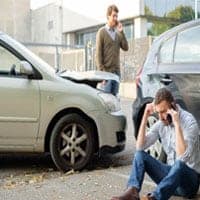 Over two million people are disabled or injured each year in car accidents in the United States. For those who have never been involved in one, it is hard to understand what it feels like. It is common for those involved to potentially go into shock, experience nausea, a rapid pulse, dizziness, and/or a racing heart.
Over two million people are disabled or injured each year in car accidents in the United States. For those who have never been involved in one, it is hard to understand what it feels like. It is common for those involved to potentially go into shock, experience nausea, a rapid pulse, dizziness, and/or a racing heart.
These symptoms make it difficult to make rational decisions, especially when compounded by minor or serious injuries.
Keeping the following in mind can go a long way towards keeping an already complicated matter from becoming more difficult.
Take Charge
First, it is important to assess the situation; if all of the passengers are uninjured and can safely exit the car, they should do so carefully. If not, 911 must be called immediately.
Leaving the scene of an accident prematurely is inappropriate, especially when people have been hurt. This could lead to fatalities, plus hit-and-run driver criminal charges. In cases of injury, property damage, or death, the police must be called, and in most cases police reports filed.
It is recommended that both drivers exchange driver’s license details and phone numbers. Insurance card information, including the VIN (Vehicle Identification Number), and insurance company name and policy number should also be recorded.
Taking photos of the vehicles, license plates, and the actual accident scene will also be useful. If there were any witnesses, they should be spoken to, and their contact information taken down, both by you and by the police.
Auto Insurance
Drivers should contact their auto insurance companies as soon as possible after the accident. The company will need to know exactly how the accident occurred, and about any sustained injuries. They are responsible for deciding who is at fault. If they assess vehicle damages, vehicle owners should get several replacement or repair quotes. Insurance company adjuster estimates do not always concur with these, so mediation may be required.
In single-vehicle accident claim situations, the driver can choose not to submit a claim. If the vehicle hit a standing object, the damage might be minimal and not worth the effort. Damages can be paid out-of-pocket, or a claim can be made. The latter may increase insurance rates, however.
New Jersey is a no-fault insurance state. However, at-fault drivers, as determined by the insurance companies, can be open to lawsuits by the others involved in the accident. Staying in touch with the insurance company is very important in these situations.
Medical Treatment
Injured drivers and passengers that seek medical treatment should keep detailed records of all hospital, physician, and other medical services received. This includes medical reports, medications, and invoices.
If the injuries are more serious, victims should record how their daily routines, activities, work, and family life are impacted.
Being Cautious
Anyone involved in a car accident should not discuss it with individuals other than their insurance company, lawyer, or the police. They should not talk about it with the other party’s insurance company, unless their attorney is aware of the conversation. Even an apology could be considered an admission of fault.
If the insurance company offers a settlement, it should not be accepted immediately. Oftentimes, injuries do not present themselves until a considerable amount of time has passed.
An Egg Harbor Township Car Accident Lawyer at D’Amato Law Firm Helps Victims of Car Accidents
After a car accident, it is not always clear where to turn for help. Medical treatment, property damages, and other costs can add up, and be burdensome. Call an experienced, professional Egg Harbor Township car accident lawyer at D’Amato Law Firm. We have helped many car accident clients and will fight for your rights. Call us today at 609-926-3300 or complete an online form today.
 Google Screened
Google Screened

